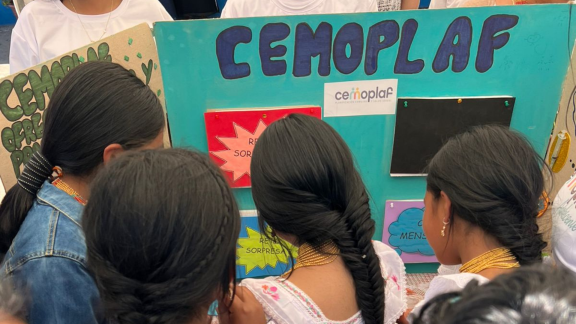From October 15 to 17, Alvaro Bermejo, IPPF’s Director-General, and Eugenia López Uribe, Regional Director for the Americas and the Caribbean, visited Ecuador to witness the outstanding work of CEMOPLAF, IPPF’s Collaborative Partner in the country. The visit served to underscore the incredible impact CEMOPLAF has had in advancing sexual and reproductive health and rights (SRHR), particularly for marginalized and indigenous communities.

CEMOPLAF’s Pioneering Work with Indigenous Communities
Since the mid-1980s, CEMOPLAF has been a pioneer in bringing SRHR services to indigenous populations in Ecuador. The organization began by establishing programs in Chimborazo, Cotopaxi, and Imbabura—provinces with significant indigenous populations living in extreme poverty. These areas had long faced limited access to healthcare, but CEMOPLAF’s approach, combining sexual health education with culturally sensitive outreach, has been key to overcoming this challenge.
Through strategic partnerships with local leaders and community health workers, CEMOPLAF ensures that its programs are not only accepted but embraced. Their integrated approach has provided indigenous communities with access to contraception and reproductive health services, while also addressing agricultural needs—an essential component for these populations. This holistic model has proven successful, expanding over the years to additional provinces like Bolívar.
CEMOPLAF's IEC (Information, Education, and Communication) initiatives have further strengthened these efforts, with home visits and personalized counselling sessions playing a critical role in ensuring confidentiality and trust within communities.

Spotlight on Adolescent Health and Peer Education
During their visit, Alvaro and Eugenia also explored CEMOPLAF's work with adolescents. The organization has been a trailblazer in Ecuador, creating information booths where young people, including indigenous youth, can get tailored sexual health knowledge in a safe and respectful environment. By training youth leaders within these communities, CEMOPLAF has fostered peer education programs that have built trust and empowered young people to make informed decisions about their sexual health.
CEMOPLAF’s innovative approach to adolescent health is not just about providing information, but also about creating opportunities for youth to become advocates for SRHR in their own communities. This peer-to-peer model has been particularly effective in fostering open dialogue and reducing stigma around contraception and sexual health.
Visiting the Clinics and Programs: A Firsthand Experience
The three-day visit also included stops at several key CEMOPLAF clinics. To start, the team visited CEMOPLAF main office, where they had the privilege to meet with the staff and youth network.
Next, the team travelled to Latacunga, where 50% of the patients served are from indigenous backgrounds. This clinic is known for its integration of adolescent health programs. The leaders met with staff, youth participants, and community members to hear firsthand the challenges and successes of providing SRHR services in the region.
The final stop was Otavalo, a town where 80% of the patients are indigenous. The clinic’s comprehensive services, which include dental and pediatric care alongside SRHR services, have made it a vital part of the community. CEMOPLAF’s collaboration with local religious and municipal leaders has further strengthened its outreach to rural areas.

Looking Forward
This visit not only highlighted the essential role CEMOPLAF plays in Ecuador’s healthcare landscape, but also reaffirmed IPPF’s commitment to supporting and amplifying the efforts of its Membership. The inspiring work of CEMOPLAF demonstrates the power of combining healthcare with cultural understanding and community involvement to achieve lasting change.
As IPPF’s leaders return from their visit, the focus will be on continuing to build on the success of CEMOPLAF’s programs and ensuring that SRHR services remain accessible to those who need them most, especially in the face of poverty and social inequality.

when
country
Ecuador
region
Americas & the Caribbean
Related Member Association
CEMOPLAF










